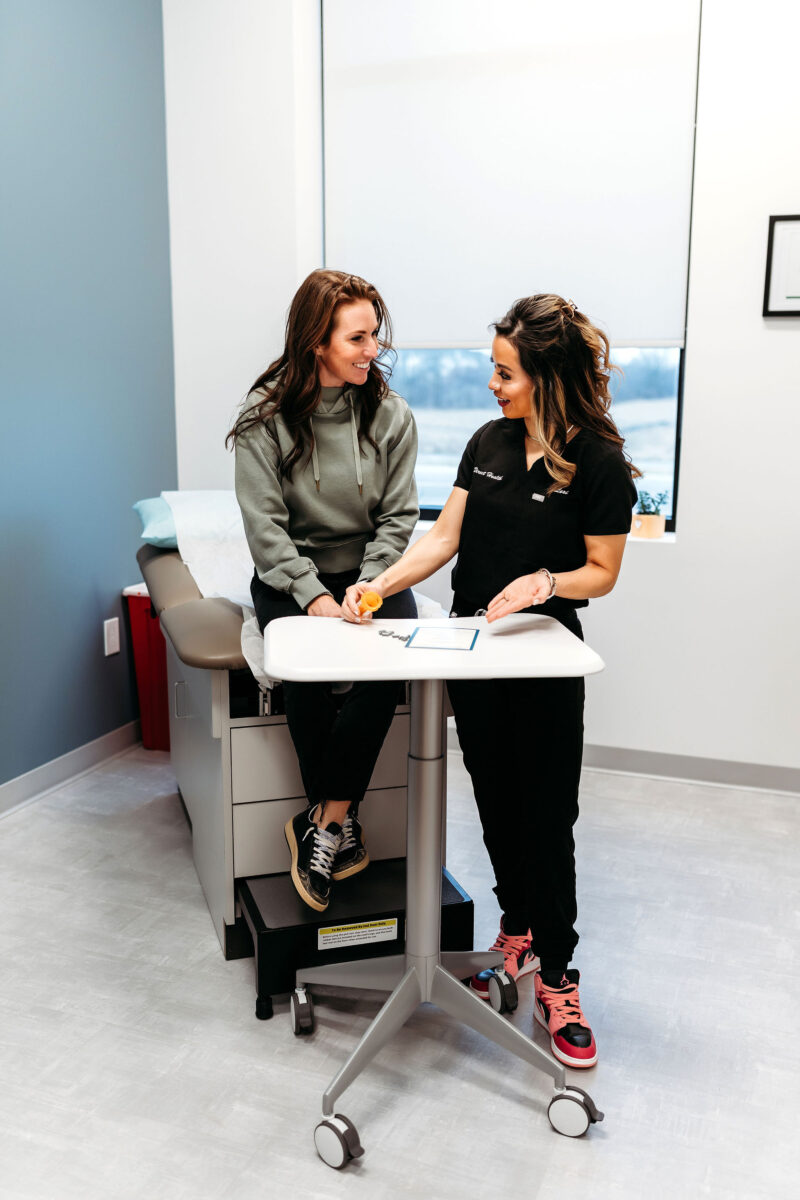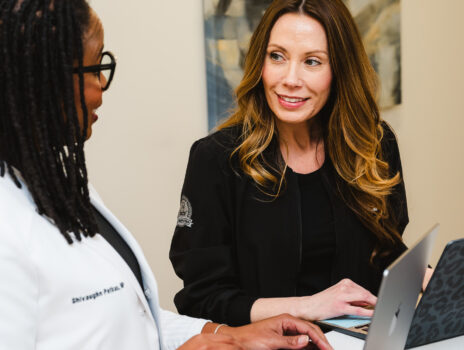Menopause is a natural transition every woman will experience, but the way it is understood and managed has long been shaped by myths, fear, and misinformation. One of the most misunderstood aspects is the relationship between hormone replacement therapy (HRT) and breast cancer risk. At Yoo Direct Health, we believe women deserve clarity, evidence, and empowerment when it comes to their choices around menopause care.
It’s important to seek expert advice on HRT, including when to start, how long to continue, and when to stop therapy, to make informed decisions about your health.
Let’s break down what the science really says.
Menopause: A Major Life Transition
Menopause typically occurs between ages 45–55 and marks the end of a woman’s reproductive years. During this time, estrogen and progesterone production declines, leading to symptoms such as:
- Hot flashes and night sweats
- Vaginal dryness and painful intercourse
- Mood swings and anxiety
- Sleep disturbances
- Cognitive changes (“brain fog”)
- Loss of bone density and increased fracture risk
- Increased risk of cardiovascular disease
These changes are a natural part of transitioning into older age.
While menopause is a natural process, the symptoms can significantly impact quality of life and long-term health. That’s where HRT comes in.
Understanding Breast Cancer
Breast cancer is a disease that begins when cells in the breast start to grow uncontrollably, forming a tumor that can often be felt as a lump or seen on a mammogram. According to the National Cancer Institute, breast cancer is one of the most common cancers affecting women, and understanding its risk factors is key to prevention and early detection. While the exact cause of breast cancer remains unclear, research has identified several factors that can increase a person’s risk, including a family history of breast cancer, certain genetic mutations, and previous radiation exposure to the chest.
Recognizing the symptoms of breast cancer—such as a new lump in the breast or underarm, changes in breast shape or size, skin dimpling, or unusual nipple discharge—is crucial for early intervention. Regular mammograms, breast self-exams, and clinical breast exams are essential tools to detect breast cancer in its earliest, most treatable stages. By staying informed about your health history and risk factors, and by following recommended screening guidelines, women can take proactive steps toward early diagnosis and effective treatment.
What is Hormone Replacement Therapy (HRT)?
HRT involves supplementing the body with bioidentical or synthetic forms of estrogen and, when necessary, progesterone. HRT is also known as hormone therapy and is a common medicine used to treat menopause symptoms. It can be delivered through pills, patches, gels, or pellets.
The goal isn’t simply to relieve hot flashes—it’s to restore balance, improve bone and heart health, protect the brain, and maintain vitality during the second half of life.
Where the Fear Began: The WHI Study
The fear linking HRT and breast cancer largely stems from the Women’s Health Initiative (WHI) study published in 2002. The headlines were alarming: “HRT Causes Breast Cancer.” Millions of women stopped therapy overnight, and many clinicians grew wary of prescribing it.
But here’s the truth: the WHI study has been widely reinterpreted over the past 20 years.
Key points that were often overlooked:
- The increased breast cancer risk was found only in women who took synthetic estrogen plus a synthetic progestin.
- Women who took estrogen alone (those who had hysterectomies) actually had a reduced risk of breast cancer.
- Most participants were over the age of 63 when they started therapy—well past the age when menopause begins.
The WHI study also examined the incidence of different types of breast cancers among women taking various forms of HRT.
What We Know Today
Recent research paints a much clearer, more nuanced picture:
- Estrogen alone is not the villain.
- In fact, estrogen therapy without synthetic progestins may lower breast cancer risk.
- Progesterone type matters.
- Synthetic progestins (like medroxyprogesterone acetate) are linked to increased risk.
- Bioidentical progesterone has not shown the same risk profile.
- Timing is critical.
- Starting HRT within 10 years of menopause onset is associated with the best benefits and lowest risks for cardiovascular and cognitive health. For some women, appropriate use of HRT may help extend life by reducing the risk of serious health conditions.
- Breast cancer risk is not the same for every woman.
- Family history, genetics (such as BRCA mutations), lifestyle, and personal medical history all play a role.
- The absolute risk increase is small.
- Even in women who do experience a slightly higher risk, it is often less than the risk increase from factors like alcohol consumption, obesity, or lack of exercise.
HRT vs. Untreated Menopause
Another important perspective: untreated menopause carries its own risks. Most people going through menopause will experience at least some symptoms or health changes, even if they are mild. Lower estrogen levels are linked to:
- Higher risk of osteoporosis and fractures
- Increased risk of heart disease (the #1 killer of women)
- Possible increase in dementia and cognitive decline
- Declining muscle mass and metabolic health
When you compare the risks of carefully managed HRT to the risks of untreated menopause, the balance often tips in favor of therapy—especially for women struggling with symptoms or facing long-term health concerns.
Alternative Treatments for Menopause
While hormone replacement therapy is a well-established option to treat menopause symptoms, many women seek alternative treatments to manage this transition. Approaches such as herbal supplements, acupuncture, and lifestyle modifications can offer relief for symptoms like hot flashes, night sweats, and mood swings. Incorporating a healthy diet rich in nutrients, engaging in regular exercise, and practicing stress management techniques—such as yoga, meditation, or deep breathing—can help support overall health and reduce the severity of menopause symptoms.
Maintaining a healthy weight, getting adequate sleep, and staying hydrated are also important for managing symptoms and lowering the risk of chronic diseases like heart disease and osteoporosis. Some women find benefit in therapies like cognitive behavioral therapy or mindfulness practices to address emotional changes during menopause. It’s important to consult with your healthcare team before starting any new treatments, as some alternative therapies may interact with other medicines or have side effects. By exploring a range of treatment options, women can find a personalized approach to menopause that supports their health and daily life.
Healthy Aging for Women
Healthy aging is about more than just adding years to your life—it’s about maintaining vitality, independence, and well-being as you grow older. For women, this means prioritizing a healthy diet, regular physical activity, and sufficient sleep to support both body and mind. Routine health check-ups, screenings, and vaccinations are essential for preventing chronic diseases such as breast cancer, heart disease, and osteoporosis. Managing stress through techniques like meditation, yoga, or spending time with loved ones can help protect emotional and mental health.
The American Cancer Society emphasizes that maintaining a healthy weight, exercising regularly, and limiting alcohol intake can significantly reduce breast cancer risk. Being aware of your family history, genetic factors, and any previous radiation exposure is also important for understanding your personal risk factors. By staying proactive—discussing your health history with your healthcare provider, following recommended screening schedules, and making healthy lifestyle choices—you can help prevent breast cancer and other chronic diseases, supporting a higher quality of life as you age. Remember, healthy aging is a lifelong journey, and every positive step you take today can lead to a healthier tomorrow.
Functional Medicine’s Approach
At Yoo Direct Health, we don’t believe in one-size-fits-all. Our approach to medicine, specifically functional medicine, emphasizes individualized care and root-cause analysis. We include:
- Comprehensive testing: hormones, thyroid, cardiovascular markers, inflammatory markers, and more
- Personalized treatment: tailoring HRT type, dose, and delivery to each woman’s unique needs
- Root-cause focus: addressing lifestyle, nutrition, stress, sleep, and gut health alongside hormones
- Ongoing monitoring: adjusting therapy as health, labs, and life circumstances evolve
The Bottom Line
The link between HRT and breast cancer has been oversimplified for decades, leaving countless women fearful of a therapy that could dramatically improve their health and quality of life.
The reality is:
- Estrogen therapy alone may reduce breast cancer risk.
- Bioidentical progesterone appears much safer than synthetic progestins.
- Timing, dosage, and individual risk factors matter.
- For many women, the benefits of HRT outweigh the risks.
It’s time to move beyond fear and misinformation. Women deserve open, evidence-based conversations with trusted providers about their options.
Next Step: If you’re curious about HRT or want clarity on your personal risks, schedule a consultation with Yoo Direct Health. Let’s talk about the science, your symptoms, and what’s right for you.
Learn more on The Better Yoo Podcast!



